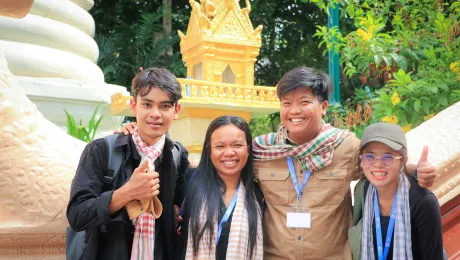LWF, ACT Alliance and WCC jointly call for a fair, ambitious agreement

LWF, ACT Alliance and WCC jointly call for a fair, ambitious agreement
GENEVA, 26 November 2015 (LWI) - International humanitarian and development faith- based networks have urged governments preparing for next week’s COP 21 United Nations climate summit in Paris to do their outmost to reach a fair, binding, and ambitious agreement as vulnerable people continue their daily struggle to adapt to the increasing adverse effects of climate change.
ACT Alliance, The Lutheran World Federation (LWF) and the World Council of Churches (WCC) have called for governments to ensure the climate agreement enables the scaling up of ambition and details concrete action in the coming years.
“Climate change is not something that will happen in the future, it is happening today, and at this very moment people are facing its effects,” said Mattias Söderberg, Head of the ACT Alliance delegation attending the Paris negotiations. “ACT Alliance members are working with communities across the world dealing with adverse climate related issues. In Central America, for example, ongoing drought has significantly reduced harvests pushing hundreds of thousands of families into food insecurity. In Asia increasing weather related disasters have left communities struggling to rebuild their lives and livelihoods. We expect the Paris agreement to be a solid stepping stone to help and encourage governments to step up ambition in the coming years,” he continued. “We also hope this agreement will inspire and encourage private companies to choose green and sustainable investments. If we end up with an agreement that stipulates low ambition, this will be a disaster, both for people now and for future generations. ”
The three organizations are all bringing delegations to the COP21 in Paris to follow the negotiations and raise the voices of the many communities around the world impacted by climate change.
LWF General Secretary Rev. Dr Martin Junge said: “I am delighted with the strong ecumenical presence at COP21. The challenge ahead of the human family is about change and conversion into new lifestyles responding to other values and goals in our lives – and faith has a role in that. Climate change poses huge challenges to justice in our world; towards those most vulnerable, and towards youth and children and generations to come. We come to Paris with a commitment to those most vulnerable.”
Rev. Dr Olav Fykse Tveit, general secretary of the World Council of Churches, said: “The leaders of the world now have an historic possibility to make commitments and agreements that we know can change the future life on this planet, for better or for worse. This is their unique privilege and their historic accountability to all life. This generation represented in COP 21 knows more about the effects of what we do to our planet than any generation before us. We can either—with open eyes—prepare for crises and catastrophes for us and our children, or we can prepare for climate justice to the world. We hope and pray for the strength and courage to do what is required at this moment.”
In their call to governments to open the doors towards climate justice, the organizations highlighted different ways in which ambitious agreement could be achieved, such as a long-term vision for decarbonization with robust rules for transparency of action and provision for review and ratcheting up every five years. They also urged that the agreement provides climate finance for those already suffering the diverse impacts of climate change.
“The UN climate talks has for many years stressed that global temperature rise must remain well below 2 degrees, and it is now time to operationalize this target,” said Archbishop Most Reverend Dr Thabo Makgoba, The ACT Alliance Global Climate Ambassador. “We need an agreement that will enable renewable energy uptake and sustainable development and resilience. People need help to adapt, and when that is not possible—when people face loss and damage to the extent that no further adaptation is possible, there must be assistance to help them to move on.”


